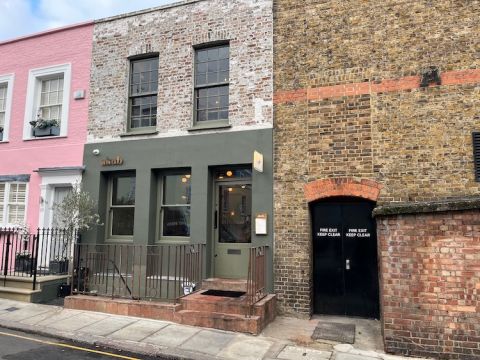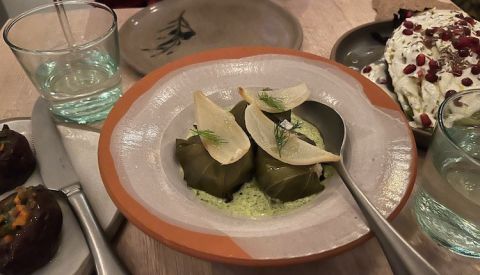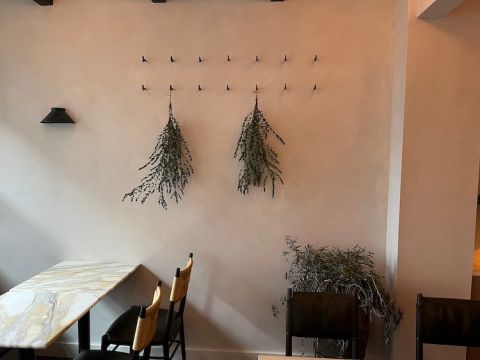This column rarely strays into politics. In one way I regret this. I do wish the behaviour of our current government would offer more opportunities to review new restaurants. But perhaps this is a subject best left to others more temperate than me. Perhaps ....
But the recent opening of (all lower case) akub, in Notting Hill Gate, just behind the Gate Cinema, has to have political ramifications, even if none are intended. akub, the Arabic for cardoons, the spiny member of the artichoke family of which Arabs eat the flowers as well as the leaves, is a recently opened, modern Palestinian restaurant.
Having nailed its colours firmly to its mast, its founder, shareholder and inspiration, Fadi Kattan (pictured above) was adamant that it is nothing more. ‘akub is not a cultural institution’, he told me firmly – well, as firmly as his soft Palestinian voice and his smiling eyes would allow. ‘We are a restaurant and our aim is to show just how good modern Palestinian cooking is and just how well the wines and spirits of my region complement everything our kitchen produces.’
‘You’ll never see beetroot hummus on our menu’, he added with a laugh.
Whether this opening could have been better timed is a moot point (it should have opened pre-Christmas) but one thing is for sure: it could not be in a more suitable location nor in better hands.
The location, up a small flight of steps on a quiet street, close to a bakery, could not be more picturesque. The four-storey building has been a restaurant since 1983, when it initially opened as Malabar, a family-owned Indian restaurant which closed during the pandemic. Its attractively homely interior proportions must make it extremely awkward for the waiting staff, but make it hugely atmospheric for customers.
The kitchen is in the basement, down one flight of stairs. There are three floors of restaurant that seat 18, 22 and 24 respectively, each linked by a relatively steep flight of stairs. There are archways and the first floor has the benefit of a great deal of natural light. There is no lift. ‘The original plans had a lift from the kitchen to the ground floor but when I saw the space,’ Kattan explained, ‘I said we must take it out. This is not a fast food restaurant.’ akub undoubtedly meets the first rule for any successful opening: that what is inside the front door accurately meets what is on the outside.
Kattan, 45, has spent the past 25 years in the hospitality business. As the son of a man whose family business is the design and installation of commercial kitchens, he has spent his entire life in restaurants. He learned to cook, he readily admits, from his grandmother and his mother. In 2004 – in an era when Palestinian cooking was known principally for meze and grilled meats – he organised the initial Palestinian Cooking Competition for professional chefs.
By the time we first met, in 2017, Kattan had moved on and was running the Hosh Al-Syrian Guest House and cafe in Bethlehem, which he had converted into a successful business with a restaurant attached. In 2018 he was contacted by Rasha Khouri, a Palestinian-born woman who lives in Notting Hill, with the notion of opening a Palestinian restaurant in London. Why not, thought Kattan? London is, after all, the most receptive of all the major cities, in his opinion, to new flavours and tastes.
Khouri found the site and put together a group of British and Palestinian investors while Kattan planned the kitchen, the menu and the wine list that initially included 12 bottles each of Palestinian white and red wines but these had all been sold by the night we arrived – a fortnight after opening – with more on the way. From a list that includes one Lebanese white, one rose and three Lebanese red wines, one Armenian and three Jordanian red wines, we very much enjoyed a Saint George Petite Sirah 2017 from Zumot Winery in Jordan for £85 (as usual, more than half the total bill, which was £165 plus service!).
We began with a spicy bread selection and a serving of their grilled Nabulsi cheese and their labaneh balls, rolled respectively in sumac, zaatar and turmeric and Aleppo pepper, this last unquestionably the spiciest combination. The cheese, whose original recipe comes from Nablus, was made here using only British ingredients and was fascinating, the soft cheese given extra flavour and texture by the addition of nuts, herbs and nigella-seed oil.
On the menu there then follows a list of 10 dishes from the land, two from the sea and four meat dishes followed by three spicy condiments under the heading 'tawabel'. What I can read clearly now, rather than having the faintly printed menu in front of me sitting in akub, is the importance of all the ingredients to the right of the principal ingredient: the pickled herbs and walnuts in the sheikh el mahshi (baby aubergines); the saffron, laban jameed (ewe’s milk yogurt) and pine nuts with the freekeh risotto; and the grape leaves and coriander tahini that added such piquancy to my fish kofta bil warak, made from skate caught just off Rye in East Sussex. It would be far easier on the eye if the entire menu and not just the dessert menu were printed on white paper.
Our desserts were slightly disappointing – not enough cheese in the cheesecake while the baba was too big – but the ice creams, zaatar and mistaka (mastic) were delicious. When I put this to Kattan he smiled with pleasure, explaining ‘the ice creams are made in collaboration with a firm called Batooli's based in Willesden, North London. It is family-owned and the wife is Palestinian and her husband is Syrian.’
akub is an important opening for Palestinian cooking and for the new flavours it will bring to London and beyond. Kattan leads by example: ‘I love hospitality. It’s magic to work so closely with people and with the ever-changing produce. We all of us take great pride in what we do but only I know that there is an invisible barrier the kitchen has yet to climb. Nothing has ever tasted as good as my memories of the food and the smells that came out of my grandmother and my mother’s kitchen.’ He added with a smile, ‘our wines are good, too, and with the new list we will also have wines from Taybeh and Ashkar wineries.’
The building has been well chosen too. It has a modest, homely feel to it, characteristics that have been accentuated by the sensitive handling of the interior by Annie Harrison of FARE Inc in her use of gentle lighting, hanging branches of eucalyptus and the more obvious olive trees adding to the comfortable atmosphere of an interior that can easily transport you somewhere a lot warmer than this part of London currently is.
akub, 27 Uxbridge Street, London W8 7TQ; tel: +44 (0)20 7792 2472
There is also a Palestinian cafe, Maramia, in Golborne Road, London W10, established in 2005.

















